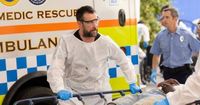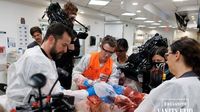In the latest episode of the gripping medical drama, The Pitt, titled "6:00 PM," the narrative takes a harrowing turn as the emergency department grapples with the chaos and carnage of a mass shooting that unfolds during the popular PittFest music festival. This heart-wrenching hour captures the intense challenges faced by hospital staff when emergency protocols are put into action, revealing not only the physical toll of such tragedies but also the emotional strain on those tasked with saving lives.
The episode opens with the urgent words of Dr. Michael "Robby" Robinavitch (Noah Wyle) as he leads his team into code triage mode, preparing for the incoming onslaught of victims. The background tension is palpable as news of the shooting spreads, and Robby prepares everyone for what he terms "no-frills combat-zone medicine." The hospital swiftly transitions into crisis mode, emphasizing the dire situations medical professionals encounter during a mass casualty event. As he succinctly puts it, "Expect the worst," Robby signifies the gravity of the situation, practical and stoic in the face of unimaginable despair.
Within the first 12 minutes, the show meticulously sets the stage for the chaos about to ensue. The emergency staff, led by Robby and Dr. Jack Abbott (Shawn Hatosy), establish color zones to efficiently triage patients based on injury severity. Abbott, whose military background becomes essential, reinforces the importance of rapid assessment when every second counts. Bewildered emergency nurses and doctors scramble to find supplies, and the urgency is underscored by the innovative use of color-coded slap bracelets to identify patients' conditions at a glance.
The storyline weaves through the hectic trauma center, introducing various characters like Dr. Trinity Santos (Isa Briones) and Dr. Mel King (portrayed by an impressive cast), as they respond to the influx of victims. Stark visuals emerge, including chilling scenes where victims arrive with deep gunshot wounds and severe injuries. Performers and festival-goers alike find themselves in the nightmarish situation of battling for their lives. The chaotic hospital environment, reminiscent of a war zone, illustrates the real horrors of American gun violence in today's society.
Chad (Rob Heaps), Dr. Cassie McKay's ex-husband, further complicates the emotions of the episode, as he enters the ER looking for their son, Harrison, amidst the carnage. His disoriented reaction mirrors the audience's gasp as he witnesses the scenes of suffering and mayhem, serving as a poignant reminder of the personal stakes involved in such tragedies.
The episode also explores interpersonal dynamics under stress, like the psychological strains between characters. Robby’s mounting anxiety crescendos when he cannot reach his stepson, Jake, who was at PittFest with his girlfriend. As the narrative develops, so too does Robby’s fear—a dread that heightens the already taut atmosphere. This emotional thread runs parallel to the stark reality of medical staff battling against time and limited resources.
Throughout the chaos, critical decisions made by the characters encapsulate the moral burdens that medical practitioners carry. In a standout moment, Mel King, initially uncertain about leading her team, rises to the occasion, even going so far as to insist on donating her own blood to save a patient in need. This selfless act not only emphasizes the dedication within the medical field but also highlights the emotional resilience required in the face of overwhelming despair.
As the episode unfolds, the gravity of the situation is palpable. Scenes shift rapidly between triaging injuries, heart-wrenching familial interactions, and the frantic energy of medical professionals. Moments of levity, such as Santos discovering a faux patient filming for social media, create a stark contrast amidst the intense atmosphere but also ratchet up the tension as the staff grapple with true desperation.
The Pitt portrays strong character arcs as well. Victoria Javadi (Shabana Azeez) finds herself asserting her expertise in front of her mother, pushing the boundaries of their strained relationship during the tumultuous events. The PTSD-like responses seen among the cast after witnessing trauma serves as a reminder of the larger ongoing discourse in America surrounding mental health and resilience in the face of gun violence.
Despite being a work of fiction, The Pitt’s representation of emergency medicine proves to be a raw examination of reality—a world where medical professionals continuously face the darkest edges of humanity. The episode speaks volumes about the ongoing gun violence epidemic in the U.S., showcasing the stark dichotomy between the trauma experienced by victims and the resilience of those tasked with providing medical care.
As the episode draws to a close, viewers are left with lingering questions regarding the fates of many characters and the greater implications of the event portrayed. Will Jake be okay? What will happen next as the hospital continues to receive patients? The Pitt masterfully holds viewers' attention as it tackles pressing issues affecting the nation, all while depicting the harrowing reality of emergency medicine.
This episode is not just a moment within the series; it reflects broader societal issues regarding gun violence. It compels viewers to confront uncomfortable truths and champion meaningful dialogue around change. By daring to depict these events onscreen, The Pitt elevates itself as a vital piece of contemporary television.
As it stands, The Pitt represents a critical commentary of our times, shining a necessary light on a struggle that crosses boundaries of fiction and reality.






